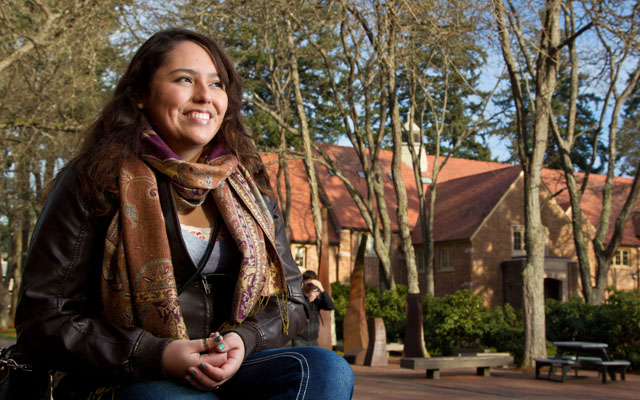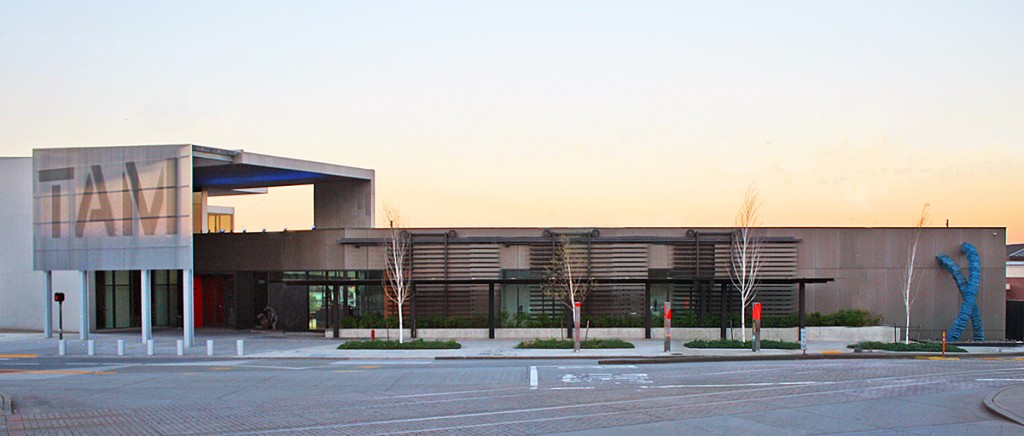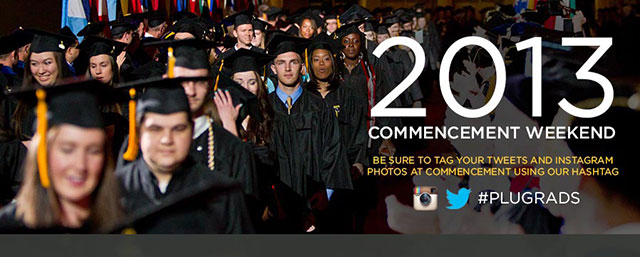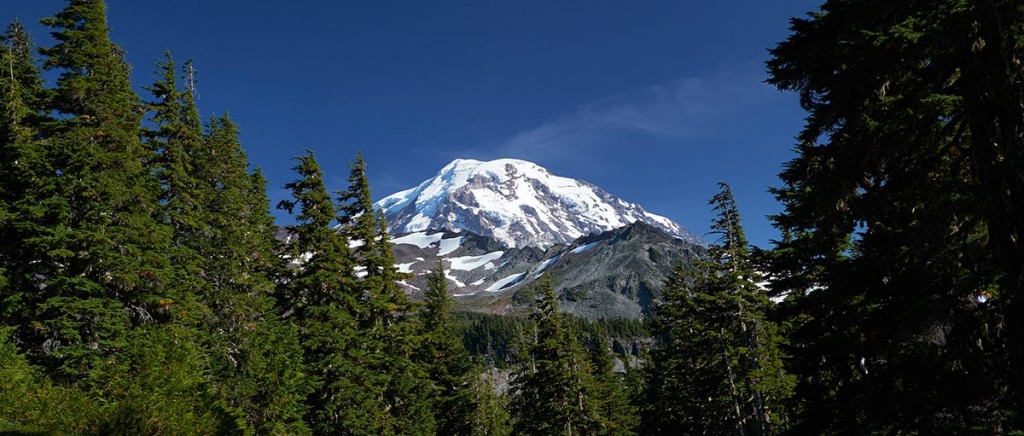Page 28 • (294 results in 0.069 seconds)
-
Tutoring program touches refugees The makeshift classroom buzzed with life as dozens of Somali Bantu children worked with PLU student-volunteers to solve math problems, sound out words and learn their colors. Jessica Baumer ’09 tried to get 13-year-old Murjan Jatar to focus on completing his…
choice is being a teacher. I like the little kids and could help them learn stuff.” St. Mark’s planned to reapply for the grant to continue the tutoring program and expand it in the future to work more directly with the Bantu parents, Summerour said. For the Bantu children to succeed in school, the parents need to be more actively involved and understand what is expected of their children. The PLU students have had a huge impact on the Bantu children. At the end of one tutoring session, a few of the
-

TOP 10 REASONS why PLU can be a great fit for you Montserrat Walker ’14 Loves the focus PLU places on global issues, and how her classes investigate issues from multiple perspectives Every student has different reasons why they have found PLU to be a…
Questions.” No doubt you have your own reasons why PLU remains a top choice. Probably a lot. Here are some of the things we feel like PLU does really, really well. (And many students agree.) So dive in. As you make one of the most important decisions of your life – the university you will attend – remember that more than 3,500 students all have their own reasons why PLU is a good fit for them. We look forward to hearing yours. Ian Kinder-Pyle ’14 likes that PLU provides numerous opportunities to get
-
A PLU graduate reflects on his time abroad I sat in one of my first classes at the University of Westminster in London flummoxed. It was days since the terrorist attacks of Sept. 11, and a European student sitting in the back of the lecture…
know or understand before. My story is not unique. The dynamic evolution of globalization has made this journey increasingly common among both students and working professionals, all the while becoming an essential component to the functioning of the world’s economies. In fact, the number of students studying abroad increased 144 percent between 1995-2005 according to the Institute for International Education. When I set out for my semester abroad in London during the fall of 2001, I didn’t have
-

TACOMA, WASH. (April 6, 2016)- Travel from the shores of Puget Sound to the fjords of Norway with the exhibition Edvard Munch and the Sea , on view exclusively at Tacoma Art Museum April 9 through July 17, 2016. This is your opportunity to dive…
his exceptional prints and a key painting.TAM has brought these dynamic works to Tacoma from major institutions across the country, including the National Gallery of Art, the Metropolitan Museum of Art, Museum of Modern Art, deYoung Museum, Los Angeles County Museum of Art and from private collectors. “While he’s best known for his iconic work The Scream, Munch explored a host of other subjects. This exhibition focuses on the sea as a profound element in his work. He used the sea as the subject of
-

In the movie Jerry Maguire , the lead character is an incredibly successful and charismatic sports agent. Jerry has a crisis of conscience one night, after the young son of one of his injured players curses him out. Jerry realizes he’s come to value his…
and routinely modified as the dynamic market we operate in continues to shift. So, we need to continue our recruitment efforts and see what our 10th day numbers are in September. I’m encouraged by the fact that graduate enrollment continues to rise and undergraduate recruitment is at five-year highs, but we need to continue to carefully monitor enrollment and retention toward our goals of a consistently high-quality educational program for our students, and a stable work environment for our
-
Jeff Clapp ’89, PLU artistic director of theater, PLU theater program undergraduate, son of a theater professor, likes to tell a story of his tenure interview. There, he was asked: What is the strength of the PLU theater program? “We sort of teach the MacGyver…
testament to this school,” she said of her upcoming production. “It is quite a gift to let a student use the mainstage for a performance. At most schools, that does not happen.” Schultz has selected “In the Garden of Live Flowers” by Attilio Favorini and Lynne Conner, a drama inspired by the life of environmentalist Rachel Carson and the writing of her groundbreaking book, “Silent Spring.” In making this ambitious choice, Schultz said she was looking to select a play that would make the audience both
-
Jeff Clapp ’89, PLU artistic director of theater, PLU theater program undergraduate, son of a theater professor, likes to tell a story of his tenure interview. There, he was asked: What is the strength of the PLU theater program? “We sort of teach the MacGyver…
testament to this school,” she said of her upcoming production. “It is quite a gift to let a student use the mainstage for a performance. At most schools, that does not happen.” Schultz has selected “In the Garden of Live Flowers” by Attilio Favorini and Lynne Conner, a drama inspired by the life of environmentalist Rachel Carson and the writing of her groundbreaking book, “Silent Spring.” In making this ambitious choice, Schultz said she was looking to select a play that would make the audience both
-

For the 2012-2013 academic year, 877 students will have graduated from PLU. Spring Commencement takes place Sunday, May 26 in the Tacoma Dome. (Photo by John Froschauer) In their own words Compiled and edited by Chris Albert This spring, new PLU graduates closed a chapter…
totaling up the points, my head finally knew what my heart had known all along: PLU was the best choice for me. My PLU experience: Over the past four years, I made life-long friends, challenged myself, and grew more than I thought possible. Rigorous work in the biology department and across campus has prepared me for a future in healthcare. Co-curricular involvement has enhanced my understanding of society, diversity, and leadership. My involvement with the Office of Residential Life, Office of
-

Diving in to “Tapped Out: Unearthing the Global Water Crisis” For the past year and a half, MediaLab students Haley Huntington, Kortney Scroger, Valery Jorgensen and Katie Baumann have traveled throughout North America documenting the importance of water and perils facing our world’s most important…
. With the issues relating to low water in this portion of the Mississippi, barges cannot carry as much weight or they will run aground, the navigational channel is not wide enough to accommodate the typical traffic, tows of barges are being delayed for days. AREC works to prevent problematic delays and shipping concerns. While the engineers who work at AREC strive for the most permanent solutions possible, with a body of water as dynamic and unpredictable as the Mississippi sometime immediate fixes
-

In recognition of the 500th anniversary of the Lutheran reformation, throughout the 2016-17 academic year a wide range of academic, community and artistic events at Pacific Lutheran University will address questions and concepts relating to Re•forming. UPCOMING EVENTS Second Annual César Chávez & Dolores Huerta…
, who oversees Pierce County Elections and a wide variety of other local government services, will be visiting Associate Professor of Politics and Government Kaitlyn Sill’s course on American government. All PLU students are welcome to attend the course for this Q&A discussion. Sponsored by the Department of Politics and Government. The Saint John’s Bible Exhibit Opening Sept. 15 | 4 p.m. | Mortvedt Library Suzanne Moore, a contributor to the Bible, will present on “Dynamic Collaboration: One
Do you have any feedback for us? If so, feel free to use our Feedback Form.


